Reginald Denning
| Sir Reginald Denning | |
|---|---|

Portrait of Major-General Denning
|
|
| Born | 1894 |
| Died | 1990 (aged 95 or 96) |
| Allegiance | United Kingdom |
| Service/branch |
|
| Rank | Lieutenant General |
| Commands held | Northern Ireland District |
| Battles/wars |
World War I World War II |
| Awards |
Knight Commander of the Royal Victorian Order Knight Commander of the Order of the British Empire Companion of the Order of the Bath Military Cross |
Lieutenant-General Sir Reginald Francis Stewart Denning KCVO KBE CB MC (1894 – 1990) was a British Army staff officer and administrator.
He was born to Charles and Clara Denning in 1894. His siblings included Alfred Thompson "Tom" Denning and Norman Denning. He joined the British Army at the beginning of World War I as a private with the Queen's Westminsters, and was sent to serve on the Western Front in 1914, where he was stationed at Ypres. He initially refused to apply for a commission until his elder brother forced him to, and in 1915 he was commissioned in the Bedfordshire Regiment. On 15 June 1915 he was severely injured. After running forward in an assault against the enemy flank he spotted some soldiers hiding in a trench. Running over to confront them he was hit with a 'pole-axe blow' to the head, which turned out to be a bullet passing through his shoulder and into the back of his head. He was left for dead and recovered consciousness about twelve hours later. A Corporal from his company picked him up and carried him to a field ambulance, and after surgery was shipped back to England, where a metal plate was put in his head.
He recovered from his wound and returned to France in 1918 to join his regiment as a company commander, but the wound had taken its toll and he collapsed. After being sent back to base he was transferred to Brigade headquarters with the 3rd Army. For the rest of the war he served as a staff captain at 3rd Army Headquarters, but was transferred back to his regiment in 1919 to take part in the training of the regiment. He served for six years as an adjutant, three years for each regular Battalion, and in 1925 attended the Staff College, Camberley. After training he again returned to the Bedfordshire Regiment and served with them in both India and England.
...
Wikipedia
